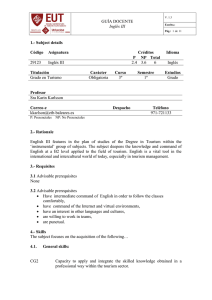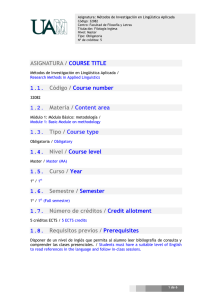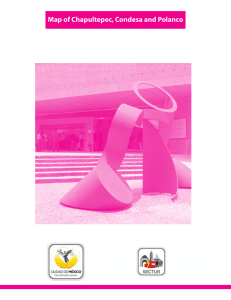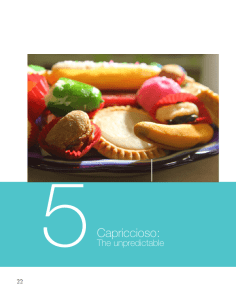GUÍA DOCENTE English III 1.- Subject`s details Código
Anuncio
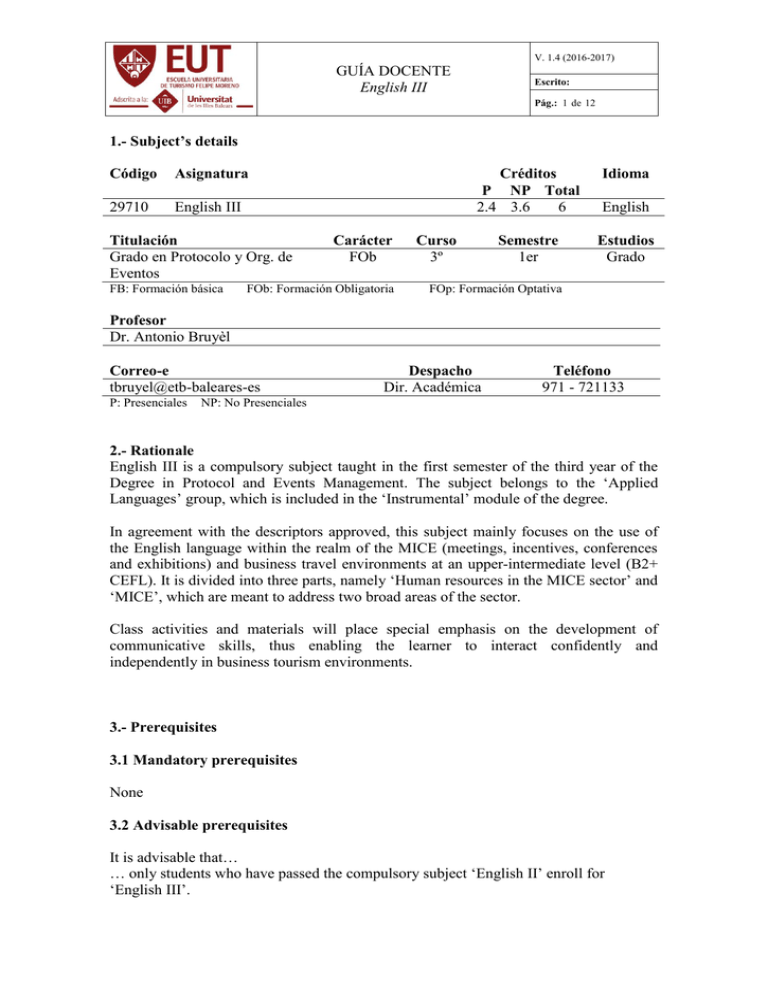
V. 1.4 (2016-2017) GUÍA DOCENTE English III Escrito: Pág.: 1 de 12 1.- Subject’s details Código Asignatura 29710 English III Titulación Grado en Protocolo y Org. de Eventos FB: Formación básica Carácter FOb FOb: Formación Obligatoria Créditos P NP Total 2.4 3.6 6 Idioma Semestre 1er Estudios Grado Curso 3º English FOp: Formación Optativa Profesor Dr. Antonio Bruyèl Correo-e tbruyel@etb-baleares-es P: Presenciales Despacho Dir. Académica Teléfono 971 - 721133 NP: No Presenciales 2.- Rationale English III is a compulsory subject taught in the first semester of the third year of the Degree in Protocol and Events Management. The subject belongs to the ‘Applied Languages’ group, which is included in the ‘Instrumental’ module of the degree. In agreement with the descriptors approved, this subject mainly focuses on the use of the English language within the realm of the MICE (meetings, incentives, conferences and exhibitions) and business travel environments at an upper-intermediate level (B2+ CEFL). It is divided into three parts, namely ‘Human resources in the MICE sector’ and ‘MICE’, which are meant to address two broad areas of the sector. Class activities and materials will place special emphasis on the development of communicative skills, thus enabling the learner to interact confidently and independently in business tourism environments. 3.- Prerequisites 3.1 Mandatory prerequisites None 3.2 Advisable prerequisites It is advisable that… … only students who have passed the compulsory subject ‘English II’ enroll for ‘English III’. GUÍA DOCENTE English III V. 1.4 (2016-2017) Escrito: Pág.: 2 de 12 … students manage the basics of oral presentations 4.- Skills 4.1 Core skills: CB 2 That students are able to professionally apply knowledge either to work or their vocation, and are in possession of the necessary skills to be demonstrated through the building and defending arguments as well as problem proving within their field of study. CB4 That students are able to communicate information, ideas, problems and solutions to both a specialist and non-specialist audience. 4.2. CG2 General skills: Capacity to learn autonomously on the grounds of identification and suitable selection of sources of different kinds. CG3 Capacity for time and resource planning, as well as for organisation and adaptation to change through the different stages inherent to event organization. CG4 Knowledge of Spanish, Catalan and English at a level enabling understanding, expression and the accurate use of tourism, protocol and events-management terminology. CG8 Capability to professionally apply methods and techniques acquired throughout the period of study, and develop them maintaining high levels of responsibility, ethical commitment and capability for integration into multidisciplinary teams. 4.3. CE3 Specific skills: Capability for the application of the regulations that govern the precedence both at public official act (either of a general and specific kind), in particular those considered in the Royal Decree of Precedence of the State and the Decrees of Precedence in force in the autonomous regions, as well as the own regulations governing non-official acts. CE11 Knowledge both of the mass media, its structure and functioning, and the public relations techniques that allow to establish interaction and mutual understanding between the organizer, its targeted public and the media, understanding the event as a communication tool. 5.- Course contents GUÍA DOCENTE English III V. 1.4 (2016-2017) Escrito: Pág.: 3 de 12 Part 1. HUMAN RESOURCES IN THE MICE SECTOR Unit 1.- Events management (Walker and Harding, 2009: 76-83) 1.1 Types of events 1.2 careers in events management (CB unit 2) Unit 2.- Getting the right job (CB unit 3) 2.1 Writing a cover letter Unit 3.- Staff development and training (CB unit 1) 3.1 Recruitment brochures 3.2. Staff training Part 2. MICE Unit 4.- Business presentations (CB unit 12) 9.1 Structuring a presentation 9.2 Signposting Unit 5.- Business travel (CB unit 13) 4.1 Business accommodation 4.2 Planning a conference 4.3 Conference problems Unit 6.- Business conferences (CB unit 14) 5.1. Conference facilities 5.2 A conference programme 5.3 Networking Unit 7.- Trade fairs (CB unit 7) 6.1 International trade fairs 6.2 Participating at a trade-fair Unit 8.- Business seminars (photocopies from CB 1st edition unit 24) 7.1 Advertising a business seminar 7.2 Taking part in a seminar 7.2 Speakers 7.3 Writing a call for papers 6.- Teaching method 6.1 In-class activities Modality Theory classes Name Content presentation Grouping Large group Description Presentation of specific lexical, grammatical and pragmatic contents listed in the subject’s contents. GUÍA DOCENTE English III V. 1.4 (2016-2017) Escrito: Pág.: 4 de 12 Introduction of professional skills featured in the subject’s contents. Exposure to language by maintaining English as the language of instruction Practical classes Listening, reading, language work Mid-sized group Development of communicative activities at a B2+ level in business and MICE situations. Class work will include specific activities focused on the four communicative skills. Practical classes will be completed with class exercises intended to develop the command of a wider range of grammatical and syntactic resources. Practical classes Role-playing Mid-sized group Role-playing of business situations that allow to apply the language and communicative functions presented in class. Assessment Progress-assessment tests Large group Formal assessment of grammar and lexical acquisition. Students will take six progress assessment tests on completion of: unit 1 units 2 & 3 unit 5 unit 6 unit 7 unit 8 Assessment Final exam Large group Formal assessment of communicative skills. In the case of students following pathway B, it will include Use of English. Assessment Business presentation Small group -Performance of a brief presentation with the use of visual aids, and interaction with public by answering questions posed. - 6.2 Distance / self-study activities Modality Name Written assignment Description Individual selfstudy Daily coursework/task completion Individual completion of exercises and cases set as homework on a daily basis. Individual selfstudy Preparation for progress assessment tests Study of lexical and grammatical contents for end-of-unit tests Group self-study Preparation for role-play Group work on individual roles to be played by students in the course of the in-class simulated business situations. Individual self- Preparation for final exam Individual work on communicative skills to be assessed under final Individual selfstudy Written production of three business texts with particular focus on MICE (180 words approx.) V. 1.4 (2016-2017) GUÍA DOCENTE English III Escrito: Pág.: 5 de 12 exam conditions. study Individual selfstudy Individual design and rehearsal of an assessed five-minute presentation on a business tourism related topic. Preparation for final exam 7.- Estimated workload Modality In-class activities Content presentation Practical classes Practical classes Assessment Assessment Assessment Name Theory classes Listening, reading, lang. work Role-play Progress-assessment test Final exam Business presentation Distance / self-study activities Individual self-study Written assignment Individual self-study Daily coursework/task completion Individual self-study Preparation for progress assessment tests Group self-study Preparation for role-play Individual self-study Preparation for final exam Individual self-study Preparation for assessed business presentation Total Hours 60 13,5 30 9 3 1,5 3 ECTS 2.4 0.54 1.2 0.36 0.12 0.06 0.12 % 40 9 20 6 2 1 2 90 9 40 3.6 0.36 1.6 60 6 26.7 14 0.56 9.3 14 9 4 0.56 0.36 0.16 9.3 6 2.7 150 6 100 8.- Week-by-week plan First semester Week 1 In-class activities: 2 hours (Unit 1: Events management (Walker and Harding, 2009: 76-83)). Theory classes: content presentation: 1 hr. Practical classes: practical activities: 1 hrs. (listening, reading, language work) Distance/self-study activities: 4 hours Individual self-study: daily coursework/task completion: 4 hrs. Week 2 In-class activities: 4 hrs. (Unit 2: Getting the right job (CB unit 3)) Assessment: Progress assessment test 1 (unit 1): 30 mins. Theory classes: content presentation: 1 hr. Practical classes: practical activities: 2 hrs. (listening, reading, language work) GUÍA DOCENTE English III V. 1.4 (2016-2017) Escrito: Pág.: 6 de 12 Distance/self-study activities: 5 hrs. Individual self-study: Preparation for progress assessment test 1 (unit 1): 2 hrs. Individual self-study: daily coursework/task completion: 3 hrs. Week 3 In-class activities: 4 hrs. (Unit 2: Getting the right job (CB unit 3)) - Theory classes: content presentation: 1 hr. - Practical classes: practical activities: 2 hrs. (listening, reading, language work) - Practical classes: practical activities: 1 hrs. (role-play) Distance/self-study activities: 3 hrs. Individual self-study: daily coursework/task completion: 3 hrs. Week 4 In-class activities: 4 hrs. (Unit 3.- Staff development and training (CB unit 1)) - Theory classes: content presentation: 1 hr. - Practical classes: practical activities: 1 hrs. (role-play) - Practical classes: practical activities: 2 hrs. (listening, reading, language work) Distance/self-study activities: 7 hrs. Individual self-study: daily coursework/task completion: 1 hrs. Individual self-study: Written assignment 1: A letter of application: 3 hrs. Individual self-study: preparation for progress assessment test 2 (units 2 &3): 2 hrs. Group-self-study: Preparation for role-play: 1 hr. Week 5 In-class activities: 4 hrs. (Unit 3.- Staff development and training (CB unit 1)) - Theory classes: content presentation: 1 hr. - Practical classes: practical activities: 1 hrs. (role-play) - Practical classes: practical activities: 2 hrs. (listening, reading, language work) Distance/self-study activities: 6 hrs. Individual self-study: daily coursework/task completion: 3 hrs. Individual self-study: preparation for progress assessment test 2 (units 2 & 3): 2 hrs. Group-self-study: Preparation for role-play: 1 hr. Week 6 In-class activities: 4 hrs. (Unit 4.- Business presentations (CB unit 12)) - Assessment: Progress assessment test 2 (unit 2 & 3): 30 mins. - Theory classes: content presentation: 1 hr. - Practical classes: practical activities: 2.5 hrs. (listening, reading, language work) Distance/self-study activities: 6 hrs. Individual self-study: daily coursework/task completion: 3 hrs. Group-self-study: Preparation for role play (business presentation): 3 hrs. Week 7 In-class activities: 4 hrs. (Unit 4.- Business presentations (CB unit 12)) Practical classes: Role play (business presentations): 4 hrs. GUÍA DOCENTE English III V. 1.4 (2016-2017) Escrito: Pág.: 7 de 12 Distance/self-study activities: 5 hrs. Group-self-study: Preparation for role play (business presentation): 5 hrs. Week 8 In-class activities: 4 hrs. (Unit 5.- Business travel (CB unit 13)) - Theory classes: content presentation: 1 hr. - Practical classes: practical activities: (listening, reading, language work): 3 hrs. Distance/self-study activities: 5 hrs. Individual self-study: daily coursework/task completion: 3 hrs. Group-self-study: Preparation for role play: 2 hrs. Week 9 In-class activities: 4 hrs. (Unit 5.- Business travel (CB unit 13)) Theory classes: content presentation: 1 hr. Practical classes: practical activities: (listening, reading, language work): 3 hrs. Distance/self-study activities: 5 hrs. Individual self-study: daily coursework/task completion: 3 hrs. Individual self-study: preparation for progress assessment test 3: 2 hrs. Week 10 In-class activities: 4 hrs. (Unit 6.- Business conferences (CB unit 14)) - Assessment: Progress assessment test 3 (unit 5): 30 mins. - Theory classes: content presentation: Unit 6 1 hr. - Practical classes: practical activities: (listening, reading, language work): 2.5 hrs. Distance/self-study activities: 3 hrs. Individual self-study: daily coursework/task completion: 3 hrs. Week 11 In-class activities: 3 hrs. (Unit 6.- Business conferences (CB unit 14)) - Theory classes: content presentation: Unit 6 1 hr. - Practical classes: practical activities: (listening, reading, language work): 1 hrs. - Practical classes: practical activities: (role play: ‘key factors when choosing a conference destination’): 2 hrs. Distance/self-study activities: 9 hrs. Individual self-study: daily coursework/task completion: 2 hrs. Group-self-study: Preparation for role play ‘key factors when choosing a conference destination’: 2 hrs. Individual self-study: Written assignment 2: ‘writing a conference programme’:3 hrs. Individual self-study: Preparation for progress assessment test 4 (unit 6): 2 hrs. Week 12 In-class activities: 2 hrs. (Unit 7.- Trade fairs (CB unit 7)) Assessment: Progress assessment test 4 (unit 6) 30 mins. GUÍA DOCENTE English III V. 1.4 (2016-2017) Escrito: Pág.: 8 de 12 Theory classes: content presentation: 30 mins. Practical classes: practical activities: (listening, reading, language work): 1 hrs. Distance/self-study activities: 3 hrs. -Individual self-study: daily coursework/task completion: 3 hrs. Week 13 In-class activities: 4 hrs.: (Unit 7.- Trade fairs (CB unit 7)) -Theory classes: content presentation: 1 hr. -Practical classes: practical activities: (listening, reading, language work): 3 hrs. Distance/self-study activities: 8 hrs. -Individual self-study: daily coursework/task completion: 3 hrs. -Individual self-study: Preparation for progress assessment test 5 (unit 7): 2 hrs. -Individual self-study: Written assignment 3: ‘Choosing an exhibition stand’: 3 hrs. Week 14 In-class activities: 4 hrs.: (Unit 8.- Business seminars) -Assessment: Progress assessment test 5 (unit 7) 30 mins. -Theory classes: content presentation: 1 hr. -Practical classes: practical activities: (listening, reading, language work): 2.5 hrs. Distance/self-study activities: 4 hrs. -Individual self-study: daily coursework/task completion: 3 hrs. -Individual self-study: preparation for Final exam: 2 hrs. Week 15 In-class activities: 4 hrs. (Unit 8.- Business seminars) -Assessment: Progress assessment test 6 (unit 8) 30 mins. -Theory classes: content presentation: 1 hr. -Practical classes: practical activities: (listening, reading, language work): 2.5 hrs. Distance/self-study activities: 8 hrs. Individual self-study: Preparation for progress assessment test 6 (unit 8): 2 hrs. Individual self-study: daily coursework/task completion: 3 hrs. Individual self-study: preparation for Final exam: 3 hrs. Individual self-study: preparation for assessed business presentation: 2 hrs. Week 16 In-class activities: 4,5 hrs. Assessment: business presentations (3 hrs.) Assessment: final exam (1.5 hrs). Distance/self-study activities: 9 hrs. Individual self-study: preparation for business presentation: 3 hrs. Individual self-study: preparation for Final exam: 4 hrs. Individual self-study: preparation for assessed business presentation: 2 hrs. GUÍA DOCENTE English III V. 1.4 (2016-2017) Escrito: Pág.: 9 de 12 9.- Assessment Assessment procedure Pathways Description Type Progress-assessment test Six progress-assessment tests, which include: -direct and back translation -multiple choice items -cloze test Business presentation -Performance of a brief presentation with the use of visual aids -Answering questions from the audience R Written assignments (*) - Written production of three business documents with particular focus on MICE: - A letter of application - A conference programme - A call for papers NR -Two listening comprehension extracts to be listened to twice Listening Final exam 300-word text Exercises may include: -Content questions -Cloze text Reading Use of English R: Retrievable NR Assessment criteria Acquisition of specific language structures and vocabulary introduced. - Structure & register - Language use (signposting, accuracy) and correctness - Lexical accuracy - Fulfilment of communicative task - Format & register (signposting…) - Language correctness - Lexical accuracy - Fulfilment of communicative task -Understanding of business oral tests at B2+ level -Understanding of business written texts at B2+ level R -direct and back translation -multiple choice items -written descriptions Acquisition of specific language structures and vocabulary introduced. A B 18 - 20 20 24 20 19 20 19 20 0 20 NR: Not retrievable (*) NOTICE: Without prejudice to the provisions of Art. 33 of the UIB Academic Regulation (ACORD NORMATIU del dia 18 de març de 2016 pel qual es modifica l'Acord normatiu 10959/2014, de 18 de març, pel qual s'aprova el Reglament acadèmic de la Universitat) any form of fraud in the evaluation or, in particular, plagiarism (i.e. the deliberate use of someone else’s text without acknowledging its source) in the written assignments will be penalized with a ‘fail’ in the assignment where plagiarized text had been detected. 9.1 Retakes Candidates who do not pass the subject in the ordinary period of assessment will sit for a retake exam covering the activities designated as retrievable (R). The final grade will result from averaging the grade obtained with the grades obtained during the ordinary period of assessment in the not retrievable (NR) activities. Unless otherwise specified, the retake exam will include the following papers: Assessment procedure Retake exam Business presentation Description -Performance of a brief presentation with the use of visual aids -Answering questions from the audience Assessment criteria - Structure & register - Language use (signposting, accuracy) and correctness - Lexical accuracy Weight A B 20 20 GUÍA DOCENTE English III V. 1.4 (2016-2017) Escrito: Pág.: 10 de 12 Listening Reading Use of English -Two listening comp. extracts to be listened to twice - Fulfilment of communicative task -Understanding of business oral tests at B2+ level 300-word text Exercises may include: -Content questions -Cloze text -Understanding of business written tests at B2+ level -direct and back translation -multiple choice items -written descriptions -Acquisition of specific language structures and vocabulary introduced. 19 20 19 20 0 20 10.- Resources, bibliography and additional documents. 10.1 Core bibliography Brook-Hart, G. (2006) Business benchmark. (Upper intermediate) 2nd ed. Cambridge: Cambridge University Press. Walker, R. and Harding, K. (2009). Tourism 3. Management. Oxford: Oxford University Press. 10.2 Additional reference 10.2.1 Professional skills Mascull, B. (2004). Business Vocabulary in Use. Cambridge: Cambridge University Press. Williams, E.J. (2008). Presentations in English. Oxford: MacMillan. Downes, C. (2008). Cambridge English for Job-hunting. Cambridge: Cambridge University Press. Stephens, B. (2011). Meetings in English. Oxford: MacMillan. 10.2.2. Grammar (self-study) Duckworth, M. (2003). Business Grammar & Practice. Oxford: Oxford University Press. Eastwood, J. (2001). Oxford Practice Grammar. Oxford: Oxford University Press. Hewings, M. (2003). Advanced Grammar in Use, Cambridge: Cambridge University Press. Swan, M. (1996). Practical English Usage. Oxford: Oxford University Press. Thomson, A.J. and Martinet, A. V. (1986) A Practical English Grammar. 4ª Ed. Oxford: Oxford University Press. GUÍA DOCENTE English III V. 1.4 (2016-2017) Escrito: Pág.: 11 de 12 10.2.3. Dictionaries Alcaraz Varó, E. et al. (2000). Diccionario de Términos de Turismo y Ocio. InglésEspañol/Spanish-English. Barcelona: Ariel. Collins COBUILD English Dictionary for Advanced Learners (3rd edition). Glasgow: Harper Collins. VVAA.(2006). Oxford business English Dictionary for learners of English. Oxford: Oxford University Press. v.1.2 CONTRATO DOCENTE English III Junio 2009 Julio 2016 Contrato docente DATOS DEL ALUMNO APELLIDOS _____________________________Nombre__________________ DNI __________________ Curso ________ Fecha de nacimiento _________________ Población __________________________ Domicilio _________________________________________________ Teléfono _________________ Correo-e: _________________________________ DATOS DE LA ASIGNATURA Asignatura _______Inglés IV ___________________________ Código ____29138________ Profesor/a responsable __Dr. Antonio Bruyèl-Olmedo_______________________________ Itinerarios de evaluación propuestos: Actividades (*) Progress-assessment test Business presentations Written assignments Final exam Recuperación (marcad) Recuperable (R) No recuperable (NR) NR R NR R Total: Porcentaje de puntuación Itinerario A Itinerario B 18 20 24 38 0 20 20 60 100 100 El itinerario por defecto será el ‘A’. Aquellos alumnos que por motivos justificados deseen acogerse a uno de los otros itinerarios propuestos, deberán firmar este contrato docente. Itinerario seleccionado por el estudiante (marcad): Itinerario A - Itinerario B (*) La descripción de las actividades de evaluación se encuentra en el guía docente de la asignatura. CONTRATO ENTRE PROFESOR Y ALUMNO Los abajo firmantes acuerdan que para obtener la calificación de la asignatura, el alumno será evaluado de las actividades integradas en el itinerario seleccionado. La firma de este contrato implica el compromiso de realizar todas las actividades incluidas en el itinerario seleccionado. (Firma del alumno) Palma, ___ de _____________ de 2________ (Fir ma del profesor/a)
